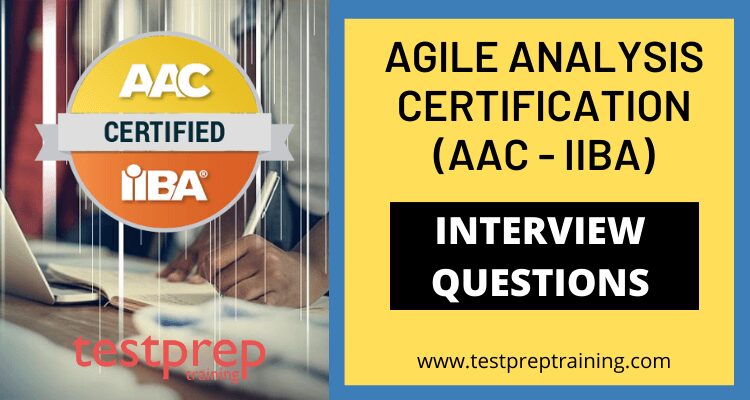AAC Agile Analysis Certification
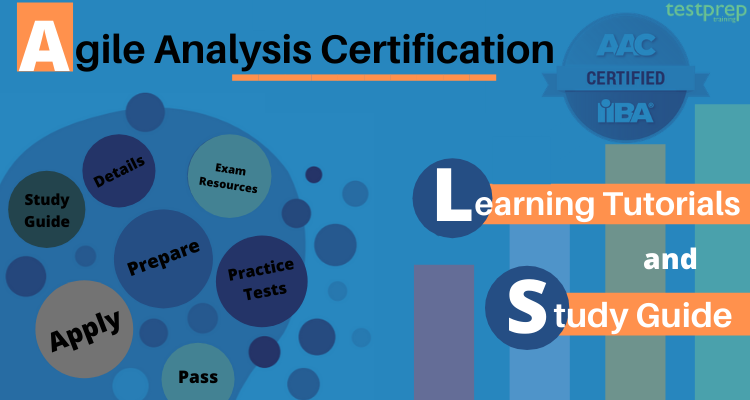
The IIBA Agile Analysis Certification (AAC) exam is aligned to the Agile Extension to the BABOK® Guide, version 2. This exam tests candidate’s ability to answer questions focused on real-world scenarios. However, the Agile Extension developed in collaboration with the Agile Alliance, describes good practices, techniques, and other key information that have better business outcomes and adds customer value when work is executed using various agile approaches. Candidates who perform well in this exam are those that have developed the requisite competencies.
IIBA AAC Certification Requirement
IIBA AAC exam is a competency-based certification exam that recognizes a candidate’s development of enhanced capabilities. However, this exam is for business analysis professionals having two to three years of experience in executing analysis with related work in an agile context.
Target Audience
This certification is for:
- Candidates who are BA professionals and working in agile environments
- Those who have knowledge in increasing business analysis skill set and expertise
- Those who stay up-to-date on best practices and industry trends
Agile Analysis Certification (AAC-IIBA) Interview Questions
Learning Objectives
For IIBA Agile Analysis Certification (IIBA-AAC) Exam, candidates who do well in this exam are those that have developed the requisite competencies. However, the practice analysis study identifying the analysis work agile leaders expect candidates to perform in an agile context provides the foundation for the IIBA AAC exam. This includes,
![]() : Having a fundamental awareness of basic skills and knowledge involved in the work
: Having a fundamental awareness of basic skills and knowledge involved in the work
![]() : Recognizing the key elements of the work and why they are important.
: Recognizing the key elements of the work and why they are important.
![]() : Adhering to prescribed ways to complete the work but needs rules and guidelines to successfully execute.
: Adhering to prescribed ways to complete the work but needs rules and guidelines to successfully execute.
IIBA AAC Exam Pattern
The IIBA Agile Analysis Certification (AAC) exam contains four domains with weighted percentages. For the IIBA AAC questions, there will be 85 multiple-choice and scenario-based types of questions. Candidates will be given two hours to complete the exam. However, the IIBA AAC exam cost for members is $250 USD and for non-members, it is $375 USD. Candidates can give the AAC exam in the English language.
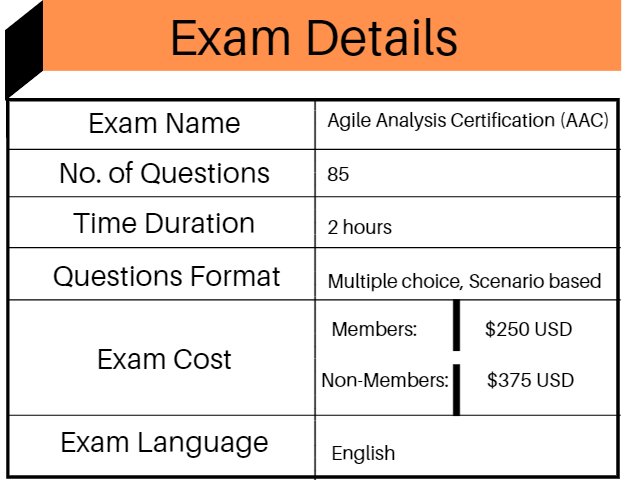
Exam Scheduling Process
For IIBA AAC Exam scheduling candidates need to follow some steps that are:
Step 1: Candidates first have to purchase the exam they want to give from the IIBA Store. Then, log in with IIBA credentials and select Certification > My Certifications. After that, click on the Apply button. Once the exam fee is paid, the candidates will receive an email confirming purchase with the next step link.
Step 2: After that, candidates need to complete attestations email to access IIBA Portal and click on the Get started button to complete the attestations for the Code of Conduct and Terms and Conditions.
Step 3: Now, candidates can schedule the exam by selecting the Get started button. And, this will automatically take you to the PSI scheduling page. There, just select Schedule Exam and after completing this step, you will be directed to the “View Details” page.
Course Structure
The IIBA AAC exam covers the following topics:
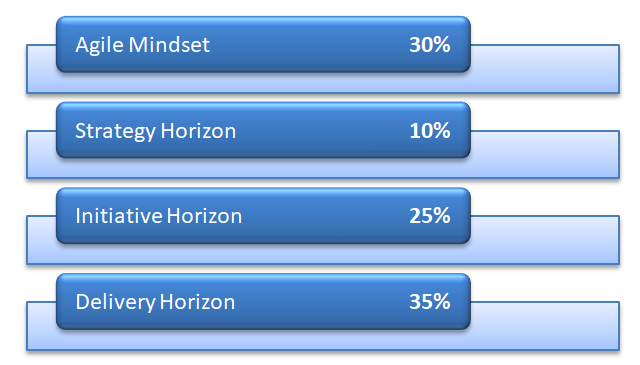
Domain 1: An Agile Mindset
Developing agile mindset is essential to achieve success when working in an agile context. However, developing an agile mindset is not something that candidates can expect to develop as a result of reading about it. The agile mindset is developed over time and through applying the agile principles of business analysis to the outcomes produced. (IIBA Reference: Agile methods)
Domain 2: Strategy Horizon
The following explains the typical work performed by an agile practitioner at the Strategy Horizon with a foundational level of proficiency:
2.1 Developing Initial Product Backlog/Required Business Capabilities (IIBA Reference: PO vs BA – are they the same?)
- Understanding and identifying capabilities check
2.2 Releasing plan
- Basic knowledge in scope MVP/MMF check
2.3 Ongoing strategy work (IIBA Reference: Strategic Plan)
- Basic Stand-up (weekly/monthly) check knowledge
- Basic knowledge of identifying Scenarios check
2.4 Reviewing and Maintaining Product Backlog/Required Business Capabilities (IIBA Reference: Business Analysis)
- Following rules to identify new items
Domain 3: Initiative Horizon
This domains explains typical work performed by an agile practitioner at the Initiative Horizon with a foundational level of proficiency:
3.1 Developing Initial Release Log / MVP Backlog
- Understanding and identifying features check (IIBA Reference: Putting Planning Horizons into Practice)
- Identifying and understanding solution options check (IIBA Reference: Solution Evaluation)
- Understand and Identifying solution components check
3.2 Releasing plan
- Following rules for sScope MVP/MMF and subsequent product increments check
- Understanding the estimate features check (IIBA Reference: Perspectives)
- Understanding and prioritizing features check (IIBA Reference: Global Business Analysis Core Standard)
- Elaborating features check
- Following rules for reviewing or updating solutions components check
3.3 Release close
- Following rules for reviewing outcomes produced including: “Are we continuing to deliver value?” check
- Updating scope for next Release/MVP check
Domain 4: Delivery Horizon
This explains the typical work performed by an agile practitioner at the Delivery Horizon with a foundational level of proficiency: (IIBA Reference: Embrace Agility)
4.1 Developing Product Increment Backlog (IIBA Reference: Agile Analysis)
- Understanding and developing product increment backlog check
- Understanding and identifying stories / cards check
- Basic knowledge in estimating and sizing product increment backlog items check
- Understanding and prioritizing product increment backlog items check (IIBA Reference: Checklist)
4.2 Iteration planning (IIBA Reference: BA Planning and Monitoring)
- Basic knowledge of reviewing acceptance criteria/Understand “definition of done” check
- Understanding and identifying work to complete stories/cards check
- Elaborating features/stories – for subsequent iteration check
4.3 Ongoing iteration work (IIBA Reference:
- Following rules to elaborate stories check
- Basic knowledge of daily stand-up check
- Story development check
- Identifying Scenarios check (IIBA Reference: Scenarios check)
- Writing Scenarios and Specifications check
- Developing low fidelity models check
- Understanding and developing high fidelity models check
- Basic knowledge of acceptance tests / Assess for “done” check
4.4 Reviewing and maintaining product increment backlog
- Understanding and identifying new items check
- Basic knowledge of estimating new items check
- Prioritizing product increment backlog (IIBA Reference: Path to Prioritizing)
- Understanding and elaborating stories in product increment backlog check
- Re-estimating existing items as you get more info check
- Understanding and prioritizing product increment backlog check
4.5 Customer “show and tell” (ongoing)
- Understanding iteration demo check
- Understanding iteration retrospective check (IIBA Reference: TECHNIQUE SUMMARY)
- Identifying process improvements check (IIBA Reference: Business Processes)
4.6 Iteration close
- Reviewing outcomes produced including: “Are we ready to release?” check
- Understanding and updating product increment backlog check
For Reference: Agile Analysis Domains
Exam Process
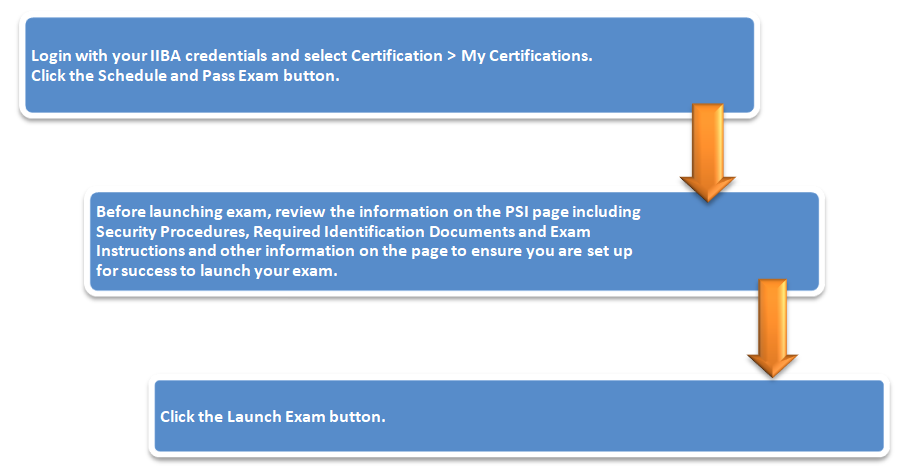
Exam Policies
IIBA provides exam policies for its certification exam to help candidates to understand the terms and conditions related to the exam. This includes:
Exam Refund Policy
To refund the fee, candidates only have 12 months from the day IIBA received an exam or exam rewrite fee to request a refund. After this time, exam rewrite fee payment will become non-refundable and you will forfeit your payment.
Reschedule Policy
Candidates who want to cancel or reschedule exam then they have to login with their IIBA credentials and select Certification > My Certifications. Then, click the Schedule and Pass Exam button to go on the PSI exam scheduling page.
Accommodations
If a candidate requires special accommodations to take the exam, do not schedule your exam. As, you will be required to provide a note from a doctor or health care professional.Then, add your note to either Google Drive, icloud or a dropbox and email a link to it with your request. For rescheduling or cancelling an exam, mention the exam date and your desired exam date in your email. After the request is approved, you will receive an email from IIBA on the next steps to follow to schedule your exam.
Re-certification Policy
To maintain the AAC certification candidates must:
- Earn a minimum of 20 CDUs within the 1-year cycle.
- They have to pay the recertification fee that is $30 for IIBA members and $50 for non-members.
- When you successfully recertify, your status will remain as Certified. If you do not recertify by your recertification date, your status will change to Suspend, and this will be reflected in your digital badge. Once in Suspend status, you will have 4 months from your recertification date to recertify.
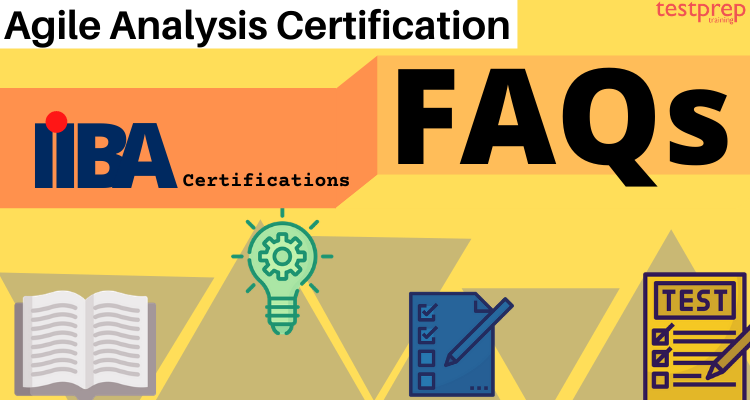
For more Visit: IIBA AAC Agile Analysis Certification Exam FAQs
IIBA Agile Analysis Certification (IIBA-AAC) preparation guide
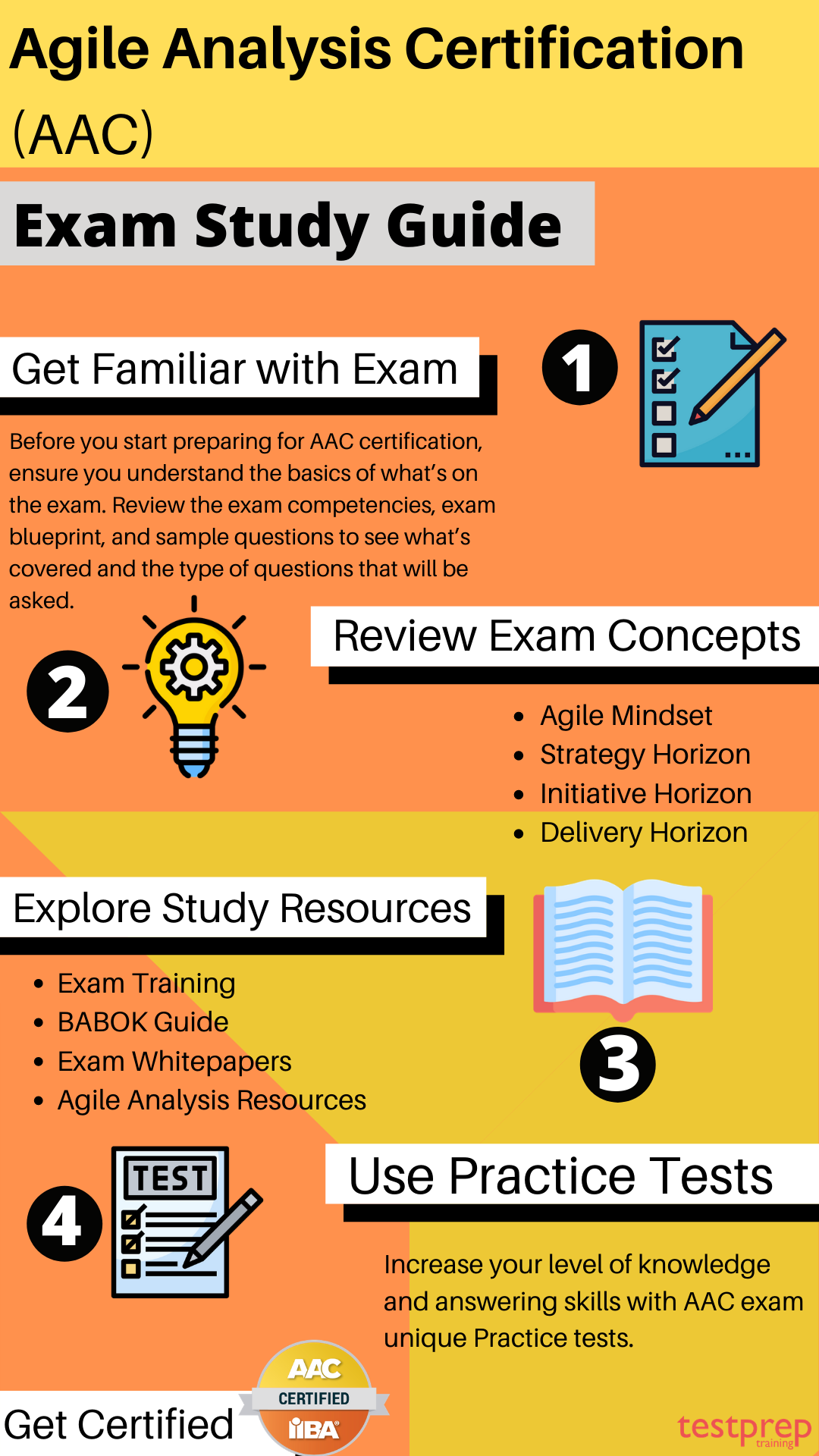
Exam Training
IIBA offers training providers globally with courses supporting the ongoing professional development of the business analysis (BA) professional from their entry into the field through to retirement. However, all IIBA training provides candidates with best-practice standards internationally recognized including the BABOK Guide and the Agile Extension for development supporting achievement of the IIBA Agile Analysis Certification. This IIBA AAC exam training will help in:
- Supporting your growth in the BA field
- Preparing you for taking an IIBA certification exam
- Enabling the maintenance of your IIBA certification
BABOK Guide
BABOK guide helps candidates to gain the related skills and knowledge that are underlying competencies to make them great at your job. However, for the IIBA Agile Analysis Certification (IIBA-AAC), BABOK Guide has six knowledge areas:
- Business Analysis Planning and Monitoring: This describes the tasks for organizing and coordinating business analysis efforts.
- Elicitation and Collaboration: This explains the tasks used for preparing and conducting elicitation activities and confirming the results.
- Requirements Life Cycle Management: This explains the tasks for managing and maintaining requirements with designing information from inception to retirement.
- Strategy Analysis: This includes the tasks to identify the business need and then addressing that need with aligning the change strategy within the enterprise.
- Requirements Analysis and Design Definition: This defines the tasks to organize requirements, specify and model requirements and designs, validate and verify information, and estimate the potential value that could be realized.
- Evaluating Solution: This explains the tasks for assessing the performance and value delivered by a solution for recommending improvements on increasing values.
Whitepapers
IIBA offers whitepapers that are published and curated by IIBA’s Global Thought Leadership program in collaboration with industry influencers and partner organizations. However, the whitepapers provide guidance and best practices information for addressing digital transformation and new technologies to deliver better business outcomes.
Agile Analysis Resources
IIBA works with global experts and practitioners across different markets to examines trends and shifting markets in business analysis to enable organizations to deliver better business outcomes. The agile analysis comes with:
- Agile Process Design
- Embrace Agility whitepaper
Practice Tests
This can be a very essential part that can help you to prepare better for the exam. That is to say, IIBA AAC practice exam tests are important as by assessing yourself with these tests you will know about your weak and strong areas. However, by practicing you will be able to improve your answering skills that will result in saving a lot of time. Moreover, the best way to start doing practice tests is after completing one full topic as this will work as a revision part for you. So, make sure to find the best IIBA AAC practice exam sources.

